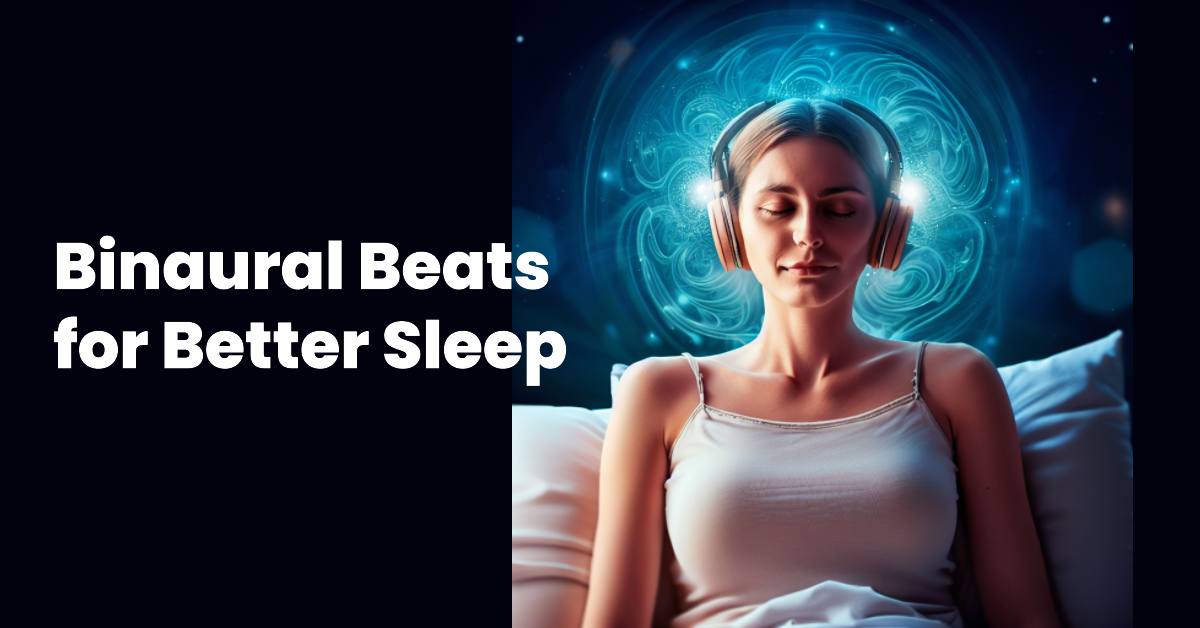Sleep is a crucial component of our overall health and well-being. Unfortunately, many struggle to get enough sleep or achieve restful, restorative sleep.
Stress, anxiety, and a busy lifestyle can all interfere with our ability to sleep deeply and peacefully. Fortunately, there are a variety of natural remedies and techniques that can help promote relaxation and improve sleep quality.
One such technique is binaural beats, a form of auditory stimulation that has been shown to impact sleep positively.
Table of Contents
What are binaural beats?
Binaural beats are an auditory illusion when two different sound frequencies are played simultaneously, one in each ear. The brain then creates a third frequency, the difference between the two frequencies.
For example, if a tone of 400 Hz is played in one ear and 410 Hz is played in the other, the brain will create a third tone of 10 Hz. This third tone is known as the binaural beat.
Binaural beats are typically played at frequencies within the range of brainwave activity, measured in Hertz (Hz).
Brainwaves are electrical patterns that occur in the brain and are associated with different states of consciousness, such as waking, sleeping, and dreaming.
There are four main types of brainwaves, each of which is associated with a different level of consciousness:
- Beta waves (12-30 Hz) are associated with waking consciousness and alertness.
- Alpha waves (8-12 Hz) are associated with a relaxed and calm mind.
- Theta waves (4-8 Hz) are associated with deep relaxation, meditation, and the early stages of sleep.
- Delta waves (0.5-4 Hz) are associated with deep sleep and unconsciousness.
Binaural beats are typically played at frequencies corresponding to these different brainwave states.
For example, if the goal is to induce relaxation and sleep, binaural beats might be played at 4 Hz, which is in the theta range.
How do binaural beats impact sleep?
Binaural beats have been shown to impact sleep in several ways positively. One of the main ways they help improve sleep is by inducing relaxation and calmness.
Listening to binaural beats can help slow down brainwave activity and promote the production of alpha and theta waves, which are associated with relaxation and meditation.
Binaural beats can help reduce stress and anxiety, common causes of sleep problems, by inducing relaxation.
Binaural beats have also been shown to improve sleep quality by increasing the amount of time spent in deep sleep.
Deep sleep is the most vital stage of sleep, during which the body repairs and regenerates tissues, strengthens the immune system, and consolidates memories.
Studies have found that listening to binaural beats can increase the duration of deep sleep and the overall duration of sleep.
Binaural beats may also help reduce the time it takes to fall asleep. Insomnia, or difficulty falling asleep, is a common sleep disorder affecting millions worldwide.
Binaural beats can help calm the mind and make it easier to fall asleep by inducing a state of relaxation and promoting the production of theta waves.
Research on binaural beats and sleep
Binaural beats have been a research topic for decades, and more recently, they have gained popularity as a tool to help with sleep.
One study by the National College of Natural Medicine in Oregon found that binaural beats can increase slow-wave sleep, which is the deep, restorative sleep essential for physical and mental health. Participants who listened to binaural beats before sleep had significantly more slow-wave sleep than those who did not listen to binaural beats.
Another study by the Sleep Research Society found that binaural beats can improve sleep quality and decrease the time it takes to fall asleep. Participants who listened to binaural beats before sleep reported feeling more rested in the morning and had less trouble falling asleep compared to those who did not listen to binaural beats.
Research has also shown that binaural beats can help with specific sleep-related conditions.
For example, a study published in the Journal of Alternative and Complementary Medicine found that binaural beats can improve the sleep quality of individuals with chronic insomnia.
Participants who listened to binaural beats for four weeks had significant improvements in their sleep quality and reported feeling more rested during the day.
Binaural beats may also have a role in managing anxiety and stress, which can impact sleep.
A study published in the International Journal of Behavioral Medicine found that participants who listened to binaural beats for 20 minutes experienced a reduction in anxiety levels.
Another study published in the Journal of Neurotherapy found that binaural beats can improve mood and decrease symptoms of depression.
While the research on binaural beats and sleep is promising, there are some limitations to consider.
For example, most studies have been conducted with small sample sizes and only over a short period. Additionally, we still don’t know much about how binaural beats impact the brain and how this translates into sleep improvements.
It’s also important to note that binaural beats are not a magic cure for sleep problems. Sleep is a complex process, and many factors, including diet, exercise, and stress levels, can impact it.
Binaural beats should be part of a comprehensive sleep plan that includes good sleep hygiene practices, such as establishing a regular sleep routine, avoiding caffeine and alcohol before bed, and creating a sleep-conducive environment.
You can check out Good Vibes if you want to try binaural beats to help with sleep. Also, listen to our binaural beats on our Good Vibes YouTube channel.
You can find a range of binaural beat recordings on the app tailored to your needs.
Do binaural beats work for lucid dreaming?
The effectiveness of binaural beats for lucid dreaming is still debatable, as the research on this topic is limited and mixed. Despite these limitations, some people have successfully used binaural beats for lucid dreaming.
While some studies have suggested that binaural beats may increase the frequency of lucid dreams and improve dream recall and vividness, others have found no significant effects.
One of the challenges with researching the effectiveness of binaural beats for lucid dreaming is that it is a complex phenomenon.
Many factors influence lucid dreaming, including individual differences, sleep patterns, and sleep quality.
However, it’s important to note that lucid dreaming is a skill that requires practice and training, and binaural beats may not be a reliable or sole solution for inducing lucid dreams.
Additionally, using binaural beats may not be effective for everyone, as some individuals may be more receptive to this type of auditory stimulation than others.
While binaural beats may have some potential for improving dream quality and increasing the likelihood of lucid dreaming, more research is needed to determine their effectiveness and how they can be used most effectively as part of a comprehensive lucid dreaming practice.
Do binaural beats work while sleeping?
When we sleep, our brain goes through different stages of activity, and binaural beats can influence these stages by producing specific frequencies corresponding to different states of mind.
Binaural beats can be used while sleeping to help induce relaxation and potentially enhance sleep quality.
For example, binaural beats in the delta range (0.5 to 4 Hz) have been suggested to help promote deep sleep and relaxation. In comparison, those in the theta range (4 to 8 Hz) may be beneficial for enhancing dream activity and facilitating lucid dreaming.
However, it’s important to note that the research on binaural beats and sleep is still limited. Their effectiveness may vary depending on individual differences and other factors such as sleep quality, age, and health conditions.
Additionally, while binaural beats may benefit sleep, they should not be relied upon as the sole solution for sleep problems. It’s important to maintain good sleep hygiene habits, such as avoiding caffeine and alcohol before bedtime, keeping a regular sleep schedule, and creating a comfortable sleep environment, to promote healthy sleep habits.
In conclusion, binaural beats may be used while sleeping to help induce relaxation and potentially enhance sleep quality.
Apps such as Good Vibes are a great way to help you examine Binaural beats’ effectiveness for your sleep. Download Good Vibes now.
Do binaural beats work for studying?
One of the advantages of using binaural beats for studying is that they can be easily incorporated into a study routine, as they only require a pair of headphones and a binaural beat recording.
Binaural beats can also be customized to target specific brainwave frequencies corresponding to different cognitive states, such as alpha waves for relaxation or gamma waves for peak performance.
However, it’s important to note that binaural beats should not be relied upon as the sole solution for studying or learning difficulties.
Maintaining good study habits, such as time management, goal setting, and active learning strategies, is still important to promote successful academic performance.
In conclusion, while more research is needed to determine the effectiveness of binaural beats for studying, they may have some potential benefits for improving concentration and focus while studying.
Binaural beats can be part of a comprehensive study routine that includes other effective study strategies if interested. Apps like Good Vibes are a good way to get yourself started on “Binaural beats + Study.”
Why Choose Good Vibes For Your Binaural Beats?
If you’re looking to improve your mental state, boost your productivity, or simply unwind after a long day, binaural beats can be a great tool to add to your routine. And when it comes to choosing a provider for your binaural beats, Good Vibes stands out as an excellent option.
Good Vibes offers a wide range of binaural beats tracks that cater to different needs, whether you’re looking for relaxation, focus, creativity, or better sleep. Their tracks are carefully crafted using high-quality audio technology and are designed to be effective and enjoyable to listen to.
In addition, Good Vibes provides a user-friendly platform that makes it easy to browse and select the right tracks for your needs. They also offer a flexible pricing model that allows you to purchase individual tracks or subscribe to their service for unlimited access to their entire library.
Overall, if you want to experience the benefits of binaural beats, Good Vibes is a top choice that offers quality tracks, a user-friendly platform which you can start using for free.
Signup with Good Vibes today for free.
Conclusion
In conclusion, research on binaural beats and sleep is promising, suggesting that binaural beats may improve sleep quality and manage sleep-related conditions.
While there are limitations to the current research, binaural beats can be a safe and non-invasive tool to try as part of a comprehensive sleep plan.
If you’re struggling with sleep, consider using Good Vibes binaural beats in your routine and see if they make a difference. Download our app for Android or iOS. You can also listen to our YouTube.









